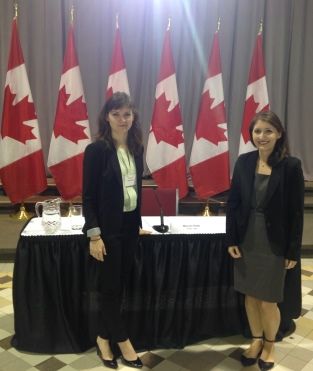
Claire Davis, Law’19, and Kate Withers, Law’17, had front row seats to watch Supreme Court of Canada (SCC) nominee Justice Malcolm Rowe be vetted for his suitability to serve on the nation’s top court. They were Queen’s Law’s student representatives at an October 25 session at the University of Ottawa, where Rowe answered questions from MPs and senators. This Q&A was part of the federal government’s new appointment process aimed at openness and transparency.
Prime Minister Justin Trudeau nominated Rowe, a justice of Newfoundland and Labrador’s Court of Appeal and the first nominee from that province, to replace Justice Thomas Cromwell, Law’76, LLD’10 (Mus’73), who retired on September 1.
Queen’s Law Reports interviewed Davis and Withers about their observations of the special event.
QLR: What was it like to witness the Q&A with SCC nominee Justice Malcolm Rowe?
Withers: It was fascinating to have the opportunity to essentially see public law in action. There was some controversy leading up to the announcement of Justice Rowe's nomination regarding the relevance of regional representation and bilingualism, and both of these issues were dealt with head on (as well as several other sensitive issues like rape shield laws and First Nations issues). It was a formal occasion, but at the same time the questioners made their thoughts very clear and were not afraid to ask the difficult questions. Justice Rowe was able to answer these very challenging questions deftly (in both English and French), and with sincerity, candidness and humor.
Davis: In his introduction, Justice Rowe discussed his upbringing in Newfoundland and his parents’ lives, notably on Fogo Island, which made me feel like the shared experiences of many Newfoundlanders were being recognized and validated. It was also a relief to hear Justice Rowe converse – and even make jokes – in French, in light of the fact that certain MPs were critical of his bilingual credentials.
QLR: Do you think Justice Rowe should be appointed to the SCC, and if so, why?
Davis: I feel he should be appointed to the Supreme Court because having regional representation in every branch of government is the best way to keep this massive landmass politically unified. With this being said, I also believe that this end could be achieved through cultural, not regional, representation. This concern was raised during the parliamentary hearing. However, even if the Supreme Court was culturally representative, I would still support the appointment of Justice Rowe, because the Atlantic provinces do genuinely have a distinct culture of their own. Furthermore, Justice Rowe assured MPs that he was committed to listening to concerns raised by people of different backgrounds and fulfilling his role with an open mind and an awareness of the different experiences within, as he called it, the mosaic.
Withers: After hearing Justice Rowe's answers at the hearing, I believe he is very much worthy of appointment to the Supreme Court of Canada. He is a humble but very accomplished individual, and I believe his answers were very thoughtful and demonstrated his awareness of and sensitivity to contentious issues ranging from victims’ rights to the proper relationship between the judiciary and legislature. Justice Rowe freely admitted to some of his own weaknesses (such as his experience in civil law), and I feel that his self-awareness and commitment to continuing to learn are crucial traits. The sincerity, candidness and empathy with which Justice Rowe answered the questions and addressed controversy reassured me that he is an excellent choice to serve as a justice at our highest court.
QLR: What stood out for you from the Q&A session MPs and senators had with Justice Rowe?
Withers: I was most struck by the concern among the questioners regarding the need for the Supreme Court of Canada to address the evolving demographics of Canada. The role of regional representation given Canada's changing demographics was debated before the nomination, and Justice Rowe addressed this issue in a very thoughtful manner that demonstrated his commitment to both our constitutional conventions and ensuring that the court is sensitive to the experiences of minority groups. Several questions were asked regarding First Nations, rape shield laws and sentencing were also asked that touched on these themes, and Justice Rowe's answers (in both French and English) emphasized his appreciation for Canada's diversity and the need for courts to give adequate weight to it.
Davis: A couple of Justice Rowe’s answers stood out to me. When asked what guides his decisions, he responded simply by saying, “the law.” When asked how he would interact with Indigenous legal issues, he summarized his answer by saying, “By listening.” And finally, when Justice Rowe was asked why he wanted to be on the Supreme Court, he expressed his initial reluctance and then his realization that Canada is a wonderful country and he wanted to do his part.